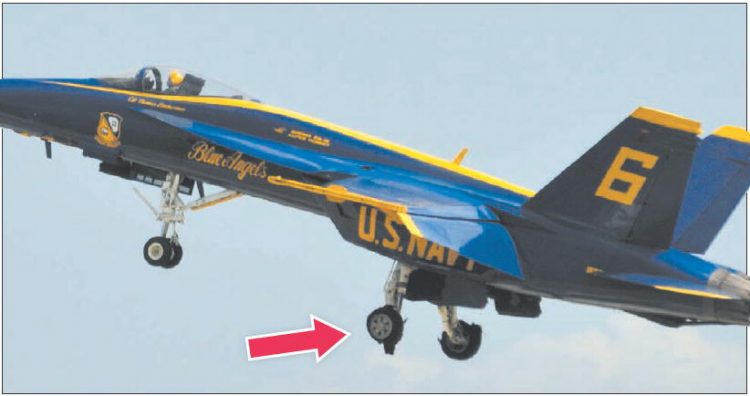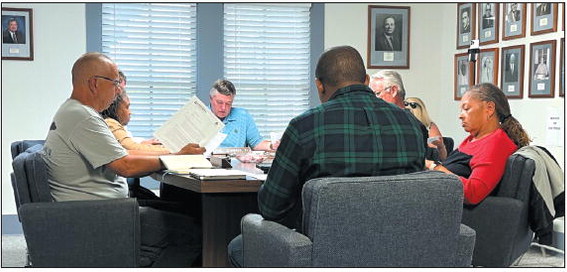Blue Angels Safety


#
The U.S. Navy Blue Angels #6 plane experienced a dramatic equipment failure during their performance at the Vidalia Onion Festival. But the Angels pilots and well trained flight crew were prepared with a contingency plan for emergencies such as this to ensure the safety of both the pilot and the spectators.
According to Cody Deccio, the Blue Angels Communications Specialist, one of the F/A-18 Super Hornets experienced two main landing gear tire failures when approaching the runway at the end of the demonstration on April 26. Upon realizing the failure, the pilot diverted his jet to the Hilton Head-Savannah International Airport. Specialists from the Blue Angels airframes work center arrived at the location and changed both main landing gear tires and brakes within 15 minutes. After continued from page
thorough inspections to make sure the jet was safe and airworthy, the pilot returned to Vidalia on Sunday morning, April 28.
Members of the Blue Angels crew said that this diversion to Savannah is just one part of the team’s emergency contingency plan, which ensures the team operates as safely as possible. These plans are organized ahead of time for every air show with various liaisons at each show site.
“This is a standard safety precaution which we implement to ensure the safety of our pilots and the crowd,” Deccio commented.
In addition to emergency contingency plans, the Blue Angels travel with a large crew of specially trained flight engineers whose sole mission is to ensure that the air show demonstrations are executed safely for both pilots and their fans.
One member of the team designated to ensure safety for the pilots is Flight Surgeon Lieutenant Commander Philippe Warren, who joined the team after witnessing the kindness that the Blue Angels pilots and crew showed his pediatric patients during his hospital residency for medical school. Since then, Warren has been a fan of the flight team, and even traveled to Vidalia for the Onion Festival in 2022 to see the group in action.
“I love coming to small town shows like this; the community has already been so friendly. It’s pretty special to come back wearing a blue suit – people are just as friendly now as they were then,” he remarked. “We love being able to come to small towns, especially those that the U.S. Navy does not have a continual presence in, and interact with the community that we are not normally around.”
As the flight surgeon, Warren serves as the primary care doctor of all officers and enlisted personnel who serve with the Blue Angels. “I go to every show, and take care of all of our officers and enlisted [men and women] for whatever medical needs pop up,” he said.
Lieutenant Warren added, “I am also the primary safety observer during each air show, practice and demonstration. I’ll be over at our communications cart at show center, watching each and every one of the maneuvers, making sure that the pilots stay safe. If I see any issues, I’ll let them know, and make sure they get on back safely.”
Warren is not the only member of the Blue Angels that ensures safety. Several enlisted personnel that travel with the team serve in logistics capacities, including Logistics Specialist Tyler Collins, who joined the military following his family’s legacy serving their country. Collins joined the Blue Angels a few years after enlisting, fulfilling a lifelong dream which he had since first watching a Blue Angels demonstration in Pensacola, Florida, as a child.
Collins’ specialties in logistics include supply and finance. “I work in supply, so I manage all of the logistics of things – getting the parts to the jets and making sure that they are able to get up,” he remarked. “I also manage the financial aspect of the Blue Angels. I manage our OPTAR, an operating target fund, which is the money that we get per year.” He emphasized that it takes an entire team’s effort to run the operation safely and efficiently.
Having the Blue Angels perform at an air show is a task that requires a lot of preparation, logistics, and contingency plans. Prior to the first jet fighter touching down at a show site, the team has already developed strategies for dealing with situations including if emergencies were to occur. These enlisted personnel are highly trained and serve in various capacities to ensure that the event is completely safe for pilots and spectators.

VIDALIA ROTARY CLUB ESSAY WINNERS — The Vidalia Rotary Club has announced Annual Essay Contest winners. The Club was able to give $6,000 in scholarships to these students. Rebecca Proenza, Vidalia Heritage Academy; Jasie Cleghorn, Vidalia High School; Max Beverly, Vidalia High School; Julia Oneal, Vidalia Heritage Academy; Aleah Ajohda, Vidalia High School; Caroline Thompson, Robert Toombs Christian Academy; Raymond Florez, Toombs County High School; Catherine Wilcox, Vidalia High School; and Dottie McDaniel, Vidalia High School.

ENSURING SAFETY – Several members of the Blue Angels Flight Demonstration Team serve to help the pilots and show operate as safely as possible, including Flight Surgeon Lieutenant Commander Philippe Warren (left) and Logistics Specialist Tyler Collins (right).Photo by Makaylee Randolph







